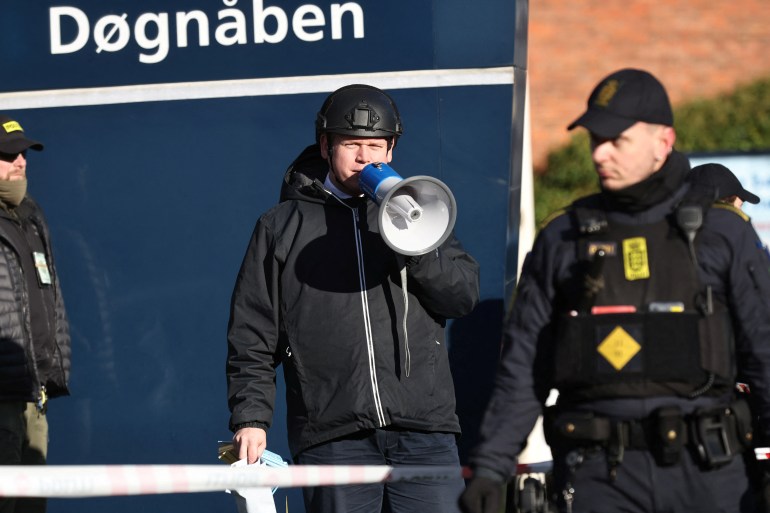Quran burned in front of Denmark mosque, Turkish embassy
Turkey summons Danish ambassador after a far-right politician burns the Muslim holy book near a Copenhagen mosque.

An anti-Islam activist has burned copies of the Muslim holy book near a Copenhagen mosque and outside the Turkish embassy in Denmark.
Rasmus Paludan, a far-right activist who holds both Danish and Swedish citizenship, had already infuriated the Turkish government by staging a Quran-burning protest in Sweden on January 21.
Keep reading
list of 4 itemsMiddle East round-up: Turkey, Sweden, NATO and the Quran
Turkey postpones NATO meeting with Sweden, Finland: State TV
Erdogan warns Sweden on NATO bid after Quran burning protest
On Friday, he replicated the stunt in front of a mosque, as well as the Turkish Embassy in Copenhagen, and promised to continue every Friday until Sweden is admitted into NATO.
Sweden and neighbouring Finland are seeking to join the military alliance amid the war in Ukraine, in a historic departure from their non-aligned policies.
However, their accession would require approval from all NATO members, and Turkey has indicated it will block Sweden’s bid – in part due to Paludan’s initial stunt.
Even before that, Ankara was pressing the two countries to crack down on Kurdish armed groups, activists and other groups it considers “terrorists”.
Ambassador summoned
Turkey’s state-run Anadolu Agency said the Danish ambassador was summoned to the Turkish foreign ministry where Turkish officials “strongly condemned the permission given for this provocative act which clearly constitutes a hate crime”.
The ambassador was told that “Denmark’s attitude is unacceptable” and that Turkey expected permission be revoked.
Turkey’s foreign ministry later issued a statement calling Paludan an “Islam-hating charlatan” and deploring the fact that he was allowed to stage the demonstration.
“Showing tolerance towards such heinous acts that offend the sensitivities of millions of people living in Europe threatens the practice of peaceful coexistence and provokes racist, xenophobic and anti-Muslim attacks,” the ministry said.
Danish foreign minister Lars Lokke Rasmussen told Danish media that the incident would not change Denmark’s “good relationship” with Turkey, adding that Copenhagen intended to talk to Ankara about Denmark’s laws upholding freedoms.
“Our task now is to talk to Turkey about how the conditions are in Denmark with our open democracy, and that there is a difference between Denmark as a country – and our people as such – and then about individual people who have strongly divergent views,” Løkke Rasmussen said.
After Paludan’s action in Sweden last week, Turkish President Recep Tayyip Erdogan warned Stockholm not to expect support for its NATO bid. Turkey also indefinitely postponed a key meeting in Brussels that would have discussed Sweden and Finland’s membership.
Police protection
On Friday, Paludan first burned a copy of the Muslim holy book outside a mosque in Copenhagen. Loud music blared from the mosque as he spoke, in an apparent attempt to drown his words, according to The Associated Press news agency.
“This mosque has no place in Denmark,” said Paludan in a live broadcast on his Facebook page, wearing a protective helmet and surrounded by riot police.
Paludan, who has police protection, was then driven away in a police car.
Later, in front of the Turkish Embassy, Paludan was quoted as saying over a bullhorn, “Once he [Erdogan] has let Sweden into NATO, I promise that I will not burn the Quran outside the Turkish Embassy. Otherwise, I will do so every Friday at 2pm.”
A lawyer, Paludan established far-right parties in both Sweden and Denmark that have failed to win any seats in national, regional or municipal elections. In last year’s parliamentary election in Sweden, his party received just 156 votes nationwide.
On Friday, protests were held in several predominantly Muslim countries to denounce Paludan’s protest in Sweden and a similar incident in the Netherlands.
The condemnation and protests in countries, including Pakistan, Iraq and Lebanon, ended with people dispersing peacefully. In Pakistan’s capital of Islamabad, police stopped some demonstrators trying to march towards the Swedish Embassy.
Meanwhile, the United States issued a security warning, cautioning US citizens in Turkey about possible retaliatory attacks against places of worship or places frequented by Westerners following the Quran-burning incidents.
